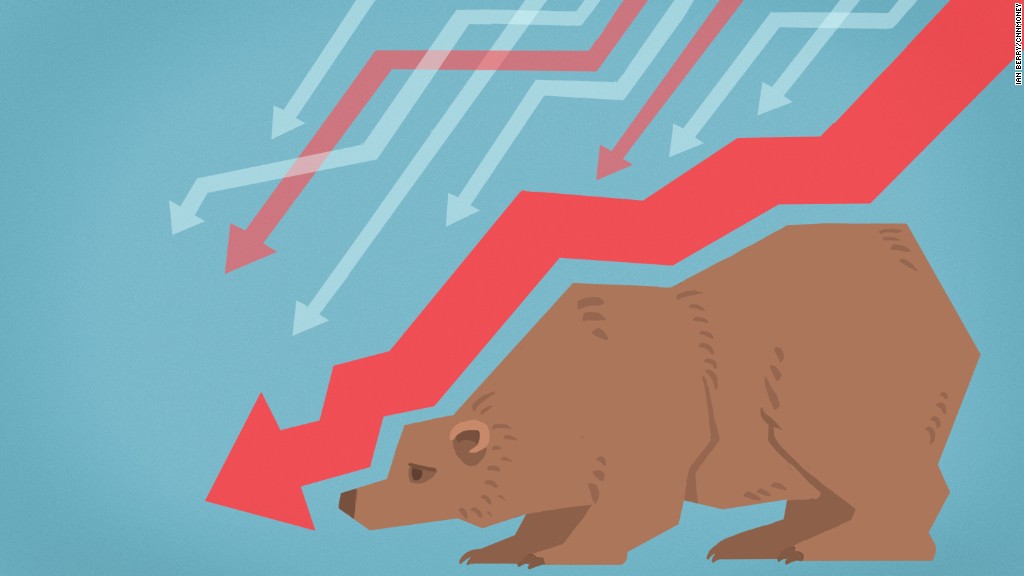
America's bull market may end soon, but it's not time to hit the panic button yet.
There's a 50% chance that U.S. stocks will dive into a bear market this year, according to a CNNMoney survey of top investment strategists. But most believe the fall would be short-lived.
Global stocks have already tumbled into bear territory -- a drop of 20% or more from the bull-market peak. The U.S. has come close -- investors have heard the bear growling -- but it hasn't hit that point yet.
"There is certainly a decent likelihood that the S&P 500 falls into bear market territory, but it may only be there temporarily," says Kristina Hooper, U.S. investment strategist at Allianz Global Investors.
Experts aren't alarmed, because they believe a big rebound is coming. The U.S. economy is too strong for stocks not to recover from here, they argue, especially if oil prices finally stop sliding.
They predict the S&P 500 will end the year with a gain of 2.5%, according to CNNMoney's latest survey. That would be a surge of over 11% from stocks are now.
Related: Can U.S. stocks still return 5% in 2016?
A recession is unlikely, says Hooper. Deep bear markets typically occur when a country falls into recession. Right now, the fundamentals of the U.S. economy are solid.
Like many strategists, Hooper points to many healthy signs such as extremely low unemployment, cheap gas, decent retail sales and a slight increase in wages.
The U.S. economy is powered by consumer spending. If Americans continue to get jobs and higher pay, that should keep buying strong and the economy chugging along, even if China, Japan and other parts of the world struggle.
"In the absence of a recession, which we do not have and are not likely to for the next year or so, bear markets tend to be short and sharp," says Brad McMillian, chief strategist at Commonwealth Financial.
Related: 20% chance of a U.S. recession this year
So is now the time to buy stocks? Expert views vary.
"Now is the time to be a selective buyer," says Joseph Quinlan, chief market strategist for U.S. Trust. He likes big companies that pay dividends. "For an investor with a three to five-year time horizon, this is a good time to increase equity exposure."
The story for much of 2015 was that stocks got expensive. The bull market, which started in March 2009, was getting tired. But the great sell-off in January has eased a lot of those fears.
The S&P 500 now trades at about 15.5 times forward earnings. That's "not at all overvalued," notes Art Hogan, chief market strategist at Wunderlich Securities. To put it another way, stocks are back at valuations not seen since early 2014.
Still, Hogan wouldn't advise going all in. This is the type of market to "average in" any bets on stocks, meaning put a bit of money in at a time.
Related: Janet Yellen: Negative rates are possible in U.S.
In addition to big, high quality companies, stocks related to homebuilding are also worth a look.
"The nascent U.S. housing recovery, combined with a strongly positioned U.S. consumer, makes homebuilders, building products and materials stocks and retailers that cater to the housing market attractive in today's environment," says Michael Arone, chief investment strategist at State Street Global Advisors.
But others, like Hooper at Allianz Global Investors, advise sitting tight.
"Although valuations have come down, they are not necessarily attractive enough to begin buying in at this point," says Hooper.
Fund managers -- people who invest for a living -- have the most cash in their funds since November 2001, according to the February Fund Manager survey by Bank of America Merrill Lynch.
It's another sign of waiting on the sidelines to see how the coming weeks -- and maybe months -- shake out.
CNNMoney's Matt Egan contributed to this article.


